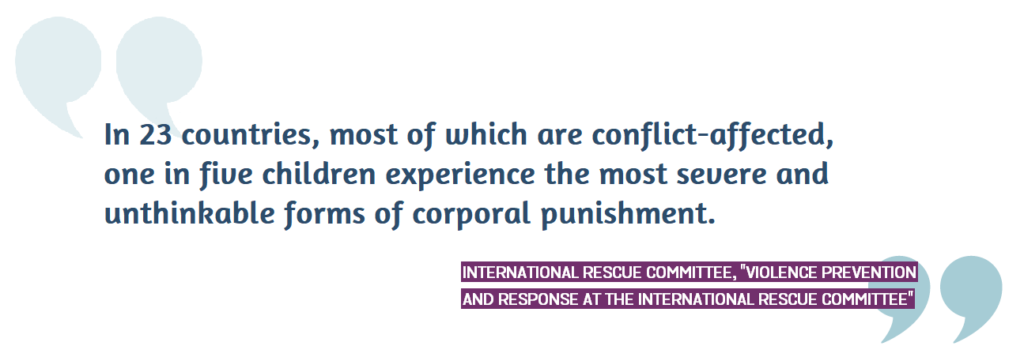Migration, conflict and disaster
Over 30 million children worldwide have been forcibly displaced by violence and conflict, and even more by natural disasters and other crises. During times of conflict and crisis, institutions and support structures that guarantee basic human rights and protection are broken down, leaving children extremely vulnerable to violence and exploitation.
Changes to children’s supervision and accompaniment, as a result of family separation or the loss of one or more carer, and extreme economic stress due to loss of livelihood or changes in income generation, can lead to lashing out against children, substance abuse and other mental health difficulties which put children at risk of violent punishment.

Girls are especially vulnerable as a result of reduced income and changes to the physical environment. Education is also profoundly affected – an essential right, and even more essential for displaced children as it can restore their sense of normalcy, structure and hope.
We must not forget the impact that so-called ‘everyday violence’ such as corporal punishment has on children who have already experienced so much violence and stress. Growing evidence shows the elevated risk of experiencing corporal punishment faced by displaced children.
Progress and delay
Protecting children from everyday violence like corporal punishment starts with law reform, which provides children with the same protection from assault as adults at all times.
See which countries have prohibited corporal punishment – and which are lagging behind:
Whenever laws relating to children are being drafted, reviewed or revised, this presents an opportunity to protect them from violence.
See if there is an opportunity to achieve prohibition in your country right now:
Learning from our partners
Human Rights Watch have reported on corporal punishment of children in schools in Lebanon, which found that Syrian refugee children may be particularly vulnerable to abuse in schools. In addition to beatings, other humiliating treatment included several examples of children prohibited from using the bathroom. Some refugee communities have stopped sending their children school in an effort to prevent abuse.
International Rescue Committee and the Behaviour Insights Unit have conducted an in-depth study on the use of corporal punishment by teachers in Nyarugusu Refugee Camp in Tanzania—the third largest refugee camp in the world and home to nearly 140,000 refugees from neighbouring Burundi and the Democratic Republic of the Congo. Evidence is emerging that teachers here view physical punishment as a way to prepare students for adulthood, teach them to respect their elders, and guide them to a better future.
